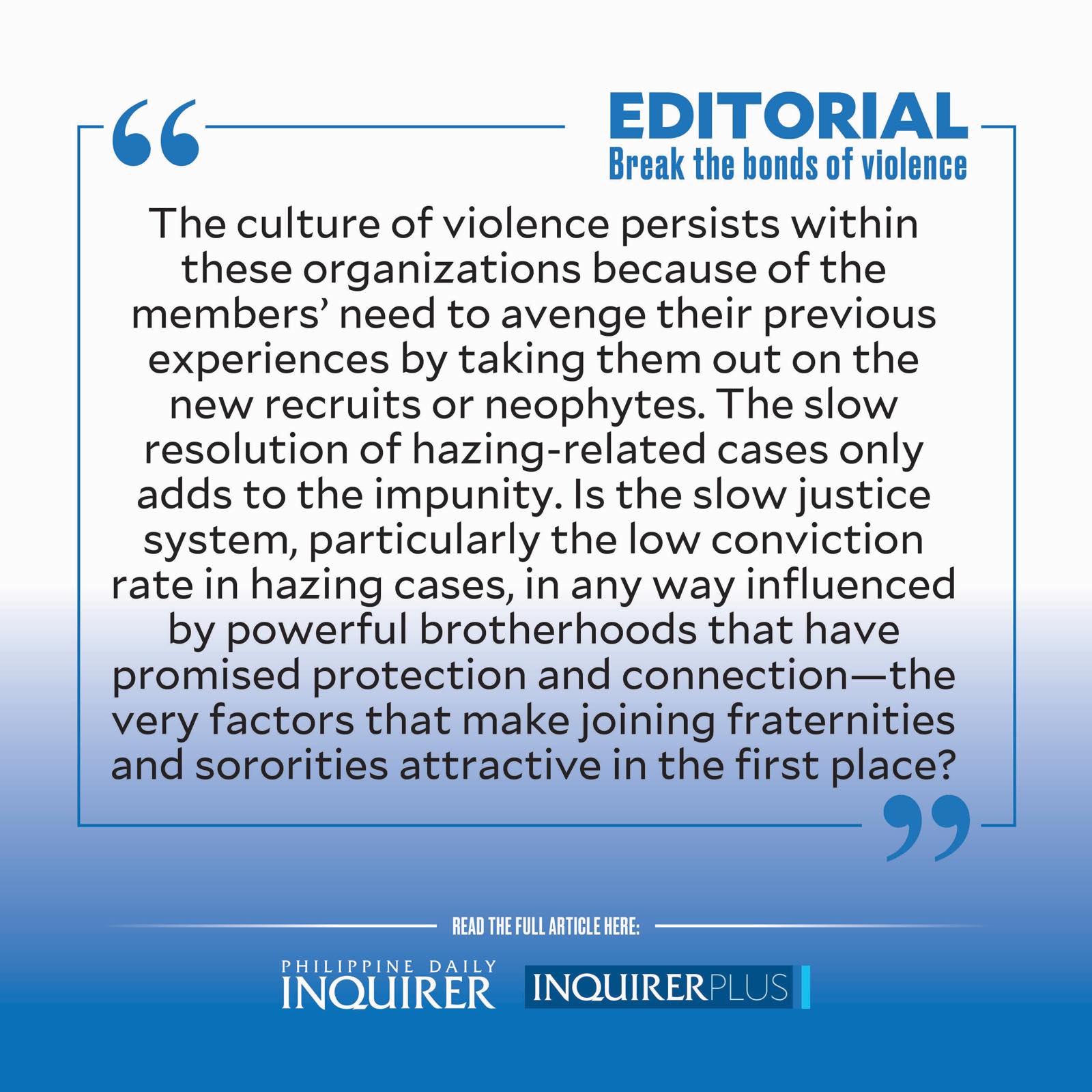Break the bonds of violence

Another young man has lost his life in the name of “brotherhood.”
Ahldryn Lery Chua Bravante, 25, a student of the Philippine College of Criminology suffered at least 60 blows during initiation rites of the Tau Gamma Phi fraternity last Monday. Bravante, who had cigarette burns on his chest and hands and severe bruises on his thighs, was declared dead on arrival at the Chinese General Hospital. He is the second known victim of hazing this year. Last February, Adamson University student John Matthew Salilig, 24, died after sustaining injuries from hazing rites—also with Tau Gamma. Unlike Bravante who was brought to a hospital, Salilig’s lifeless body was found in a vacant lot in Cavite—abandoned by his so-called “brods.”
This violent ritual of inducting recruits into organizations has persisted despite the anti-hazing law. Republic Act No. 8049, enacted in 1995 after the death of Ateneo law student Leonardo Villa in 1991, regulated hazing and other initiation rites by requiring organizations to notify school authorities a week before conducting them. Only one conviction was made in the two decades after RA 8049 was passed: in the 2006 hazing case involving the death of University of the Philippines Los Baños student Marlon Villanueva.
In 2018, RA 11053 amended RA 8049, putting more teeth into the anti-hazing law by prohibiting all forms of hazing in fraternities, sororities, and organizations in schools, including citizens’ military training and citizens’ army training. RA 11053 expanded the definition of hazing to include “physical or psychological suffering, harm, or injury inflicted on a recruit, neophyte, applicant, or member” as a prerequisite for admission into any organization. It also requires schools to be more active and proactive in protecting their students from activities that involve hazing.
But this year’s deaths only show that the law hasn’t stopped these organizations from continuing with their deadly initiation rites. That the latest death involves criminology students is ironic and should be a cause for concern because these are the young people who will later be tasked to ensure public safety and criminal justice. Being exposed to such violent practices, even normalizing them by perpetuating the practice within their organizations, should not be the path to prepare them for their future responsibilities of preventing crime and maintaining peace and order.
The culture of violence persists within these organizations because of the members’ need to avenge their previous experiences by taking them out on the new recruits or neophytes. The slow resolution of hazing-related cases only adds to the impunity. Is the slow justice system, particularly the low conviction rate in hazing cases, in any way influenced by powerful brotherhoods that have promised protection and connection—the very factors that make joining fraternities and sororities attractive in the first place?
There is, however, no sense of brotherhood or sisterhood in inflicting harm on anyone. “Sa akin, hindi kapatiran ang pinapakita nito. Sa halip, abuso ng kapangyarihan, walang saysay na pagmamalupit, kultura ng karahasan at takot, blind loyalty, at pagiging duwag sa pagharap sa pinsalang ginagawa. (For me, this is not brotherhood. Instead, it’s abuse of power, senseless cruelty, a culture of violence and fear, blind loyalty, and cowardice in facing the consequences of the harm inflicted),” lawyer Chel Diokno said in a TikTok explainer on the anti-hazing law uploaded in March after Salilig’s death. As of July, some suspects in that case were still at large.
The police should ensure that those involved in the senseless deaths of Bravante, Salilig, and others before them will be arrested, charged, and punished. In Bravante’s case, the Philippine College of Criminology must prove that it does not tolerate any form of hazing or organization that promotes illegal and violent acts—just as it has stated—by making sure that this barbaric tradition is stopped; this is the only way to show that it is training upright law enforcers, not brutes.
Hazing and other violent activities should never be condoned anywhere, most especially in schools responsible for shaping the values and mindsets of young people. Neither do they have any place in a civilized society that respects every individual’s right to life, safety, and security.
As Diokno said: “Hindi ito ang paraan para mahanap ang lugar n’yo sa lipunan at hindi ‘yan ang tipo ng lipunan na gusto natin ipaglaban. Dapat may hustisya para sa mga biktima ng hazing. At sa kabataan naman, sana huwag na natin itong i-tolerate. (This is not the way to find your rightful place in society and this is not the kind of society that we want to fight for. There should be justice for the victims of hazing. And the youth should no longer tolerate such acts).”
Schools and law enforcement agencies must end the culture of violence by enforcing the law firmly and consistently, and not make noises only when there is another life cut short by hazing.
















